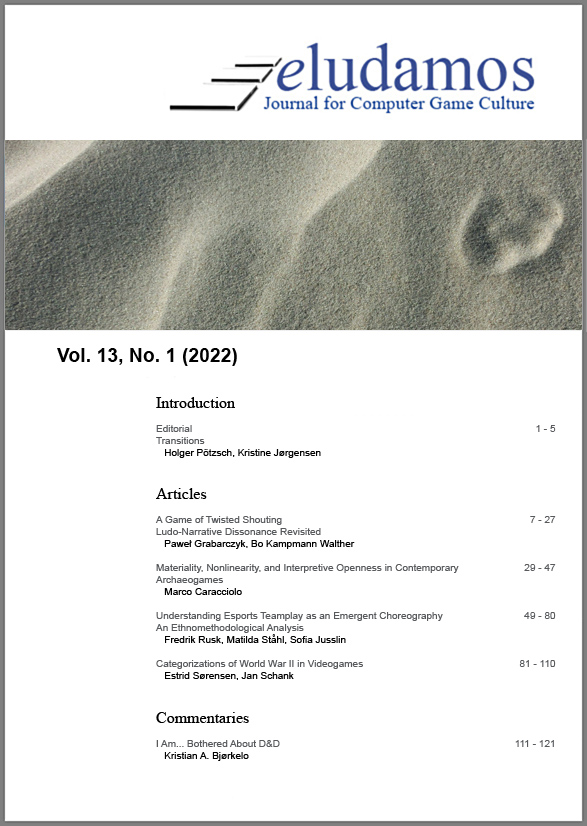Materiality, Nonlinearity, and Interpretive Openness in Contemporary Archaeogames
DOI:
https://doi.org/10.7557/23.6618Keywords:
Archaeology, history, narrative, environmental storytelling, uncertainty, objectsAbstract
Drawing inspiration from discussions on the relationship between archaeology and video games (“archaeogaming”), this article argues that contemporary games address three central concepts of archaeological theory: the uncertain materiality of archaeological finds, the way in which caring for artifacts complicates a linear or chronological understanding of history, and the open-ended quality of archaeological interpretation. The “archaeogames” I examine—which include Heaven’s Vault (Inkle, 2019), Outer Wilds (Mobius Digital, 2019), The Forgotten City (Modern Storyteller, 2021), and Elden Ring (FromSoftware, 2022)—capture these concepts by implementing a variety of gameplay and narrative mechanics. In addition to embedding archaeological objects at the level of representation, these games turn archaeological theory into a gameplay practice—a process potentially leading to the emergence of collaborative and creative storytelling within what I call archaeological fandom.
Publication Facts
Reviewer profiles N/A
Author statements
Indexed in
-
—
- Academic society
- N/A
- Publisher
- Septentrio Academic Publishing
References
Barad, K. (2007) Meeting the Universe Halfway: Quantum Physics and the Entanglement of Matter and Meaning. Durham, NC: Duke University Press. https://doi.org/10.2307/j.ctv12101zq
Bethesda Game Studios (2011) The Elder Scrolls V: Skyrim. Bethesda Softworks (Microsoft Windows).
Bennett, J. (2010) Vibrant Matter: A Political Ecology of Things. Durham, NC: Duke University Press. https://doi.org/10.2307/j.ctv111jh6w
Bennett, R. M., Krupa, K. L., Minniti, K., and Vandewalle, A. (forthcoming) What Lasts of Us: Implicit Archaeology Through Environmental Storytelling. Journal of Geek Studies.
Blain, L. (2015, December 16) Miyazaki Says Dark Souls "Has Been Completed by Players." Gamesradar.com. Available from: https://www.gamesradar.com/miyazaki-says-dark-souls-has-been-completed-players-so-no-more-secrets-then/ [Accessed: 29 November 2022].
Bogost, I. (2012) Alien Phenomenology, or What It's Like to Be a Thing. Minneapolis: University of Minnesota Press. https://doi.org/10.5749/minnesota/9780816678976.001.0001
Caracciolo, M. (2015) Playing Home: Video Game Experiences Between Narrative and Ludic Interests. Narrative, Vol. 23 (3), pp. 231-251. https://doi.org/10.1353/nar.2015.0022
Caracciolo, M. (2022) Contemporary Fiction and Climate Uncertainty: Narrating Unstable Futures. London: Bloomsbury. https://doi.org/10.5040/9781350233928
Chapman, A. (2016) Digital Games as History: How Videogames Represent the Past and Offer Access to Historical Practice. New York: Routledge.
Copplestone, T. J. (2017) But That's Not Accurate: The Differing Perceptions of Accuracy in Cultural-Heritage Videogames Between Creators, Consumers and Critics. Rethinking History, Vol. 21 (3), pp. 415-438. https://doi.org/10.1080/13642529.2017.1256615
Core Design (1996) Tomb Raider. Eidos Interactive (Sega Saturn).
Duang! Games (2016) Sethian. Duang! Games (Microsoft Windows).
Finn, E. (2017) What Algorithms Want: Imagination in the Age of Computing. Cambridge, MA: MIT Press. https://doi.org/10.7551/mitpress/9780262035927.001.0001
Foucault, M. (1969) The Archaeology of Knowledge (S.-S. Alan Mark, Trans.). New York: Routledge.
Foucault, M. (1971) The Order of Things: An Archaeology of the Human Sciences. New York: Pantheon Books.
FromSoftware (2022) Elden Ring. Bandai Namco (Microsoft Windows).
Harman, G. (2018) Speculative Realism: An Introduction. Cambridge, England: Polity Press.
Huhtamo, E., and Parikka, J. (2011) Introduction: An Archaeology of Media Archaeology. In: Huhtamo, E. and Parikka, J. (eds.) Media Archaeology: Approaches, Applications, and Implications. Berkeley: University of California Press, pp. 1-24. https://doi.org/10.1525/9780520948518
Inkle (2017) Procedural Narrative Cupcakes. Heaven's Vault Updates (blog). Available from: https://heavens-vault-game.tumblr.com/post/164556877780/procedural-narrative-cupcakes [Accessed: 29 November 2022].
Inkle (2019) Heaven's Vault. Inkle (Microsoft Windows).
Jenkins, H. (2004) Game Design as Narrative Architecture. In: Wardrip-Fruin, N. and Harrigan, P. (eds.) First Person: New Media as Story, Performance, and Game. Cambridge, MA: MIT Press, pp. 118-130.
Krzywinska, T. (2008) World Creation and Lore: World of Warcraft as Rich Text. In: Corneliussen, H. and Rettberg, J. W. (eds.) Digital Culture, Play, and Identity: A World of Warcraft Reader. Cambridge, MA: MIT Press, pp. 123-141.
Lahdenperä, L. (2018) "Live-Die-Repeat": The Time Loop as a Narrative and a Game Mechanic. International Journal of Transmedia Literacy, Vol. 4, pp. 137-159. https://doi.org/10.7358/ijtl-2018-006-lahd
Latour, B. (2005) Reassembling the Social: An Introduction to Actor-Network-Theory. Oxford: Oxford University Press.
Litchfield, T. (2022, April 16) Dataminer Reveals Cut Elden Ring Questline. PC Gamer. Available from: https://www.pcgamer.com/dataminer-reveals-cut-elden-ring-questline/ [Accessed: 29 November 2022].
Lowe, D. (2012) Always Already Ancient: Ruins in the Virtual World. In: Thorsen, T. S. (ed.) Greek and Roman Games in the Computer Age. Trondheim: Akademika Publishing, pp. 53-90.
LucasArts (1995) The Dig. LucasArts (MS-DOS).
McCall, J. (2020) The Historical Problem Space Framework: Games as a Historical Medium. Game Studies, Vol. 20 (3). Available from: http://gamestudies.org/2003/articles/mccall [Accessed: 29 November 2022].
Mittell, J. (2015) Complex TV: The Poetics of Contemporary Television Storytelling. New York: New York University Press.
Mobius Digital (2019) Outer Wilds. Annapurna Interactive (Microsoft Windows).
Modern Storyteller (2021) The Forgotten City. Dear Villagers (Microsoft Windows).
Nersessian, N. (1992) How Do Scientists Think? Capturing the Dynamics of Conceptual Change in Science. In: Giere, R. (ed.) Cognitive Models of Science. Minneapolis: University of Minnesota Press, pp. 3-45.
Olsen, B., Shanks, M., Webmoor, T., and Witmore, C. (2012) Archaeology: The Discipline of Things. Berkeley: University of California Press. https://doi.org/10.1525/9780520954007
Ortony, A. (ed.) (1979) Metaphor and Thought. Cambridge, England: Cambridge University Press.
Parikka, J. (2012) What is Media Archaeology? Cambridge, England: Polity.
Pötzsch, H., and Šisler, V. (2019) Playing Cultural Memory: Framing History in Call of Duty: Black Ops and Czechoslovakia 38-89: Assassination. Games and Culture, Vol. 14 (1), pp. 3-25. https://doi.org/10.1177/1555412016638603
Reinhard, R. (2018) Archaeogaming: An Introduction to Archaeology in and of Video Games. Oxford: Berghahn. https://doi.org/10.2307/j.ctvw04bb5
Ryan, M.-L. (2006) From Parallel Universes to Possible Worlds: Ontological Pluralism in Physics, Narratology, and Narrative. Poetics Today, Vol. 27 (4), pp. 633-674. https://doi.org/10.1215/03335372-2006-006
Swalwell, M., Ndalianis, A., and Stuckey, H. (eds.) (2019) Fans and Videogames: Histories, Fandom, Archives. New York: Routledge.
Thon, J.-N. (2016) Narrative Comprehension and Video Game Storyworlds. In: Perron, B. and Schroter, F. (eds.) Video Games and the Mind: Essays on Cognition, Affect and Emotion. Jefferson: McFarland, pp. 15-31.
Von Lünen, A., Lewis, K. J., Litherland, B., and Cullum, P. (eds.) (2021) Historia Ludens: The Playing Historian. New York: Routledge.
Downloads
Published
How to Cite
Issue
Section
License
Copyright (c) 2023 Marco Caracciolo

This work is licensed under a Creative Commons Attribution 4.0 International License.








